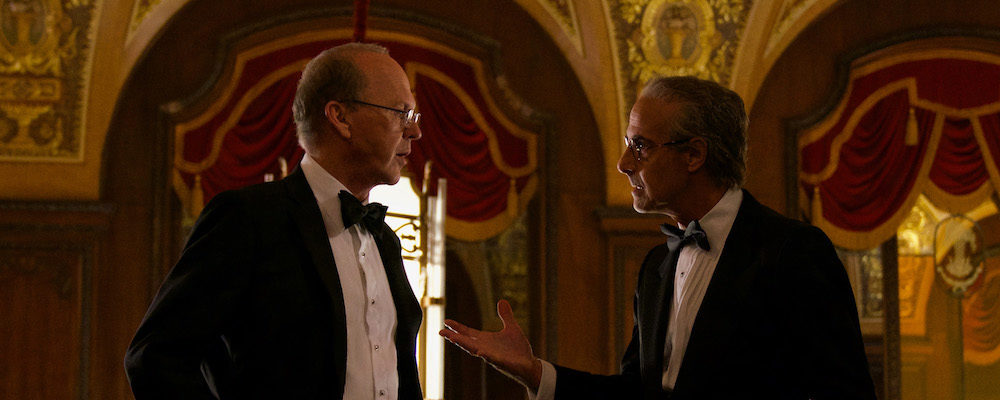‘Worth’ Looks at the Debate Over How to Compensate 9/11 Victims
Alci Rengifo
In a capitalist society much of an individual’s worth is determined by numbers. As the recent debates over pandemic stimulus programs and relief payments reminded us, in America it can all come down to money. Netflix’s “Worth” dramatizes how that reality became a complicated, at times ruthless, matter when it came to compensating families and individuals directly impacted by the terrorist attacks of Sept. 11, 2001. It remains the most devastating attack by external forces on American soil. Yet beneath all the patriotic fervor of the moment, in law offices and government halls, the power players in the wealthiest global power diddled over a victim’s worth depending on whether they were a janitor or CEO.
At the center of the debate was Ken Feinberg (Michael Keaton), an attorney and Georgetown professor who became tasked by the Bush White House, via Attorney General John Ashcroft (Victor Slezak), to head the 9/11 Victim Compensation Fund. We meet Feinberg as he’s teaching his students how the law interprets worth. Then during a train commute on Sept. 11, he sees the smoke rising from the hijacked plane that crashed into the Pentagon. Weeks after the attacks, with crews barely cleaning up the rubble of the World Trade Center in New York City, the government is aware victims’ families will seek some kind of aid. The great question is how much to give out. Ashcroft makes it clear to Feinberg that the prevailing fear is that so many requests will come in, followed by lawsuits, that the economy will crash. Now along with colleague Camille Biros (Amy Ryan), Feinberg sets out to structure a “formula” for compensation, which requires assessing how much to send recipients. Different interests begin to clash, from those who believe there should be a straight, universal amount disbursed, to lawyers for wealthier victims demanding larger sums for their clients.
Pulling off a drama like “Worth” is harder than it looks, particularly because the driving action of the narrative is in egos and intellects clashing. A true story like this one can’t be easily resolved with shootouts and chases. Director Sara Colangelo works from a crackling screenplay by Max Borenstein, who you may be surprised to learn also wrote this year’s “Godzilla vs. Kong.” Instead of dueling kaijus, here Borenstein presents a deadlier political battle. In the tradition of films like “A Civil Action,” this is not some romanticized legal thriller where the lawyers are heroic dreamers convinced the court is an arena between good and evil. It all comes down to power and who holds sway. Feinberg is an ethical man, but a practical and shrewd one as well, who at first seems hesitant to question the very nature of our economic system’s culture. He gives a disastrous speech in front of an audience of 9/11 victims’ families and drops the ball when someone questions his formula, and hints that if we’re talking about necessary financial aid, the higher ups who died in the Twin Towers had pricier mortgages to cover.
Feinberg is soon confronted by two voices of opposition, lawyers like Lee Quinn (Tate Donovan), representing wealthy corporate interests, and Charles Wolf (Stanley Tucci), a widower whose wife died in a WTC corporate office, and is now organizing against what he sees as the wrongheaded, unfair approach of Feinberg’s plan. What makes the triangle of debate here engaging is how everyone makes a fair case for their side. It is up to Feinberg, Biros and staffers like Priya Khundi (Shunori Ramanathan), to make the hard choices of how the fund will eventually operate. On a deeper level, this is a film about class in America, and how 20 years after 9/11, during which the nation has endured the Great Recession and the Covid-19 pandemic’s economic impact, the social order in our society is quite brutal when it comes to judging by income. Consider that we never even meet Quinn’s clients. Instead Feinberg and Biros have to deal directly with a gay man whose partner died in the towers, but whose conservative parents now want to cut him out of any benefits. Feinberg grows close to the case of Karen Donato (Laura Benanti), a mother whose firefighter husband died when the towers collapsed, who also left behind a brother and fellow fireman, Frank (Chris Tardio), who resents what Feinberg represents. Through them and others we see the faces of the victims of history, those caught in immense events.
Michael Keaton delivers some of his best work since “Birdman” in “Worth.” He plays Feinberg as a fiercely intelligent but sober man. He’s cultured, has served on the Washington, D.C. opera board, listens to arias in the office and on the train, but his disciplined veneer breaks down when the pressures heat up. A certain number of claimants must sign up for the fund by December 2003, and Feinberg must convince them the results will be fair and equitable. By the end the answers are not so simple and the formula developed is indeed fairer, even if the film gets murky on the details. At nearly 2 hours, “Worth” can’t explain all the small print in a government document. Now as we reflect on two decades since 9/11, this is more than an appropriate film to release. It looks back at the tragedy without emphasizing the violent horror. Instead it looks at the other human side of the story, the one about the state deciding how to help the victims, and how we as a society value a victim’s place based solely on how they get by.
“Worth” begins streaming Sept. 3 on Netflix.

